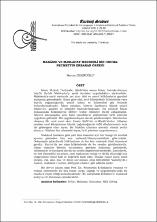| dc.contributor.author | Bekiroğlu, Harun | |
| dc.date.accessioned | 2019-06-21T06:24:19Z | |
| dc.date.available | 2019-06-21T06:24:19Z | |
| dc.date.issued | 2017 | en_US |
| dc.identifier.citation | Bekiroğlu, H. (2017). Makâsıd ve maslahat merkezli bir okuma: Necmettin Erbakan örneği. Turkish Studies (Elektronik), 12(8), 29-50. | en_US |
| dc.identifier.issn | 1308-2140 | |
| dc.identifier.uri | http://dx.doi.org/10.7827/TurkishStudies.11646 | |
| dc.identifier.uri | https://hdl.handle.net/11491/3410 | |
| dc.description | research | en_US |
| dc.description.abstract | İslam Hukuk Tarihinde, Şâtıbî’den sonra İslam hukukçularının büyük ölçüde Makâsıdu’ş- şeriâ teorisini uyguladıkları söylenebilir. Makâsıdu’ş-şeriâ naslarda yer alan dinî ve amelî hükümlerin gayeleri anlamına gelmektedir. Buna göre şâri, şer‘î hükümlerin bütününde veya büyük çoğunluğunda çeşitli mâna ve hikmetleri göz önünde bulundurmaktadır. İslam yasaları, bireyin faydasına olacak çeşitli hikmetler, gayeler ve sebepler barındırmaktadır. Bu yönüyle İslam hukukunda hükümlerin illetleri tesbit edilmeye (ta’lîl) çalışılmıştır. Böylece karşılaşılan yeni fıkhî meselelerin çözümünde ta‘lîl yöntemi uygulana gelmiştir. Bu uygulama kıyas olarak şekillenmiştir. Günümüze ulaşmış ilk usul eseri olan İmam Şâfiî’nin er-Risâle’sinden itibaren yazılan usul kitaplarının büyük çoğunluğunda ta‘lîl düşüncesinin açık bir göstergesi olan kıyas, bir hüküm çıkarma metodu olarak yerini almıştır. Böylece her dönemde kıyas/ta’lîl yöntemi uygulanmıştır. Makâsıd teorisine göre şâri tüm insanlar için her hangi bir sınıfsal ayrıma gitmeden beş ana maksadı/ilkeyi/maslahatı gözetmiştir. Dolayısıyla çıkarılacak hükümlerin de bu beş maksadı ihlal etmemesi gerekir. Kur’an’da yer alan hükümlerde de bu esaslar görülmektedir. İslam yasaları bireyin korunması gereken haklarını zarûriyyât, tahsiniyyât ve haciyyât olarak üç sınıfta değerlendirmektedir. Zarûriyyât, en üst düzeydeki yararları, yani toplumun varlığı ve dirlik düzenliği için vazgeçilmez temel hak ve değerleri ifade eder. Bunlar hayat (can), nesil (nesep, ırz), akıl, mal ve dinin korunması olup literatürde “zarûriyyât-ı hamse, makāsıd-ı hamse, külliyyât-ı hams” gibi adlarla anılır. Bir devlet adamı olan Prof. Dr. Necmettin Erbakan’ın yasama ve hukuk sisteminde bu beş esasa vurgu yaptığı ve uygulamalarında bu esaslara riayet ettiği anlaşılmaktadır. Bu çalışmada Erbakan’ın makâsıd anlayışı ele alınmaya çalışılacaktır. | en_US |
| dc.description.abstract | It might be said that Şatıbi’s theory “Makâsıdu’sŞeria” mostly has been applied by scholars of Islamic Law. The meaning of “Makâsıdu’sŞeria” is purposes that are taking part in the rules that has to be obeyed that are religious and practical provisions. Accordingly Şâri has to take into account the different meanings and aphorisms in the complete or most of the Islamic provisions. Islamic provisions are containing some purposes and aphorisms that are helpful for the individuals. From this perspective the reasons and deductions of the provisions are tried to be determined in Islamic Law. Moreover the deduction method has been used to solve the new jurisprudence problems that have been met during the process. This application in Islamic taught has been shaped as comparison. From the first methodology book er-Risale of Imam Şafii, the written methodhology books have used comparison as a source of provision method. Therefore the comparison method has been applied in every term. According the purpose theory Şari has taken into account five main purposes-principalthe reason why something is for the good, without making a classification. In this case the provisions that will be made should not breach these five purposes. These essentials can be examined in the provisions that are held in Quran. Islamic law is classifying the protection of the rights of individuals from three different perspective such as zarûriyyât, tahsiniyyât and haciyyât. Zarûriyyât is the uppermost rights, which are containing of the rights that are necessary for the unification, protection and amity of the community. These are life, generation, mind, assets and religion. In literature they are called “zarûriyyât-ıhamse, makāsıd-ıhamse, külliyyât-ı hams” meaning that the necessary five. It is been proven that Prof. Necmettin Erbakan has been emphasizing these five essentials in the jurisdiction and legislation system and he has been taking care of these essentials in his applications / practices. Erbakan’s purpose understanding will be tried to hold in this study. | en_US |
| dc.language.iso | tur | en_US |
| dc.publisher | Asos Eğitim Bilişim Danışmanlık / Akademik İletişim | en_US |
| dc.relation.isversionof | 10.7827/TurkishStudies.11646 | en_US |
| dc.rights | info:eu-repo/semantics/openAccess | en_US |
| dc.subject | Tefsir | en_US |
| dc.subject | Makâsıd | en_US |
| dc.subject | Maslahat | en_US |
| dc.subject | Milli Görüş | en_US |
| dc.subject | Interpretation | en_US |
| dc.subject | Makâsıdu’sŞeria | en_US |
| dc.subject | Purpose | en_US |
| dc.subject | The Reason Why Something Is For The Good | en_US |
| dc.subject | Islamic View | en_US |
| dc.title | Makâsıd ve maslahat merkezli bir okuma: Necmettin Erbakan örneği | en_US |
| dc.title.alternative | A reading based on purposes: example of Necmettin Erbakan | en_US |
| dc.type | article | en_US |
| dc.relation.journal | Turkish Studies (Elektronik) | en_US |
| dc.department | Hitit Üniversitesi, İlahiyat Fakültesi, Temel İslam Bilimleri Bölümü | en_US |
| dc.identifier.volume | 12 | en_US |
| dc.identifier.issue | 8 | en_US |
| dc.identifier.startpage | 29 | en_US |
| dc.identifier.endpage | 50 | en_US |
| dc.relation.publicationcategory | Makale - Uluslararası Hakemli Dergi - Kurum Öğretim Elemanı | en_US |


















